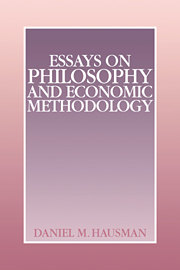Book contents
- Frontmatter
- Contents
- Introduction: What is philosophy of economics?
- PART I METHODOLOGY AND THEORY APPRAISAL
- 1 Economic methodology in a nutshell
- 2 On the conceptual structure of neoclassical economics – a philosopher's view
- 3 John Stuart Mill's philosophy of economics
- 4 The deductive method
- 5 Why look under the hood?
- 6 An appraisal of Popperian methodology
- 7 Is falsificationism unpractised or unpractisable?
- 8 The limits of economic science
- PART II CAUSALITY IN ECONOMICS
- PART III CASES AND PUZZLES
- PART IV POSTSCRIPTS
- Bibliography of relevant writings by Daniel M. Hausman
- Bibliography of works by other authors
- Index
1 - Economic methodology in a nutshell
Published online by Cambridge University Press: 05 June 2012
- Frontmatter
- Contents
- Introduction: What is philosophy of economics?
- PART I METHODOLOGY AND THEORY APPRAISAL
- 1 Economic methodology in a nutshell
- 2 On the conceptual structure of neoclassical economics – a philosopher's view
- 3 John Stuart Mill's philosophy of economics
- 4 The deductive method
- 5 Why look under the hood?
- 6 An appraisal of Popperian methodology
- 7 Is falsificationism unpractised or unpractisable?
- 8 The limits of economic science
- PART II CAUSALITY IN ECONOMICS
- PART III CASES AND PUZZLES
- PART IV POSTSCRIPTS
- Bibliography of relevant writings by Daniel M. Hausman
- Bibliography of works by other authors
- Index
Summary
The literature on economic methodology is concerned mainly with questions of theory confirmation or discontinuation or empirical theory choice. The central question is usually, “How can one tell whether a particular bit of economics is good science?” Economists would like methodologists to provide the algorithm for doing good economic science – and they want the algorithm to vindicate their own practice and to reveal the foolishness of those who do economics differently. For example, Milton Friedman (1953c) tells economists that good theories are those that provide correct and useful predictions, while Paul Samuelson (1947, 1963) tells economists to formulate theories with “operational” concepts that are, ideally, logically equivalent to their descriptive consequences.
In my view, not only are these (and most other) specific views on theory appraisal mistaken, but the concern with problems of empirical appraisal is exaggerated, for there are also interesting methodological questions to consider – both normative and descriptive – concerning the structure, strategy, goals, and heuristics of various economic theories. For example, few writers on economic methodology recognize that the activities of formulating economic models and investigating their implications are a sort of conceptual exploration. Instead, most mistakenly regard these activities as offering empirical hypotheses and assess them in terms of some philosophical model of confirmation or falsification.
As a tendentious survey of standard methodological literature, this essay will, however, share its preoccupation with the empirical appraisal of theory, microeconomic theory in particular.
Information
- Type
- Chapter
- Information
- Essays on Philosophy and Economic Methodology , pp. 13 - 24Publisher: Cambridge University PressPrint publication year: 1992
